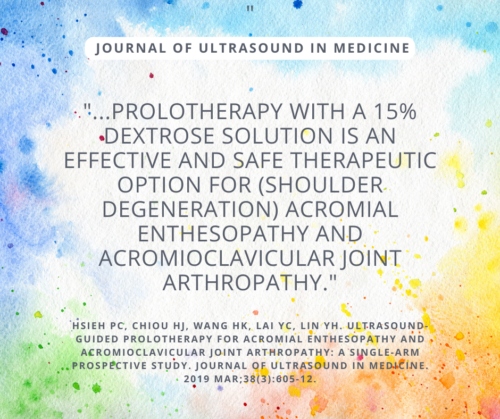
The shoulder is an incredibly mobile joint. That’s a good thing! We need our shoulders to move as they do. However, this mobility also makes the shoulder prone to injury. If you are looking for a remedy for shoulder pain, then you know this first hand. At OrthoRegen, we offer regenerative treatments as remedies for shoulder repair.
Our experience has shown that a comprehensive treatment program is preferred to treat shoulder pain for optimal long-term results. This is because most shoulder injuries involve the shoulder ligaments and/or tendons. Therefore, treating all the involved ligaments and tendons results in the best repair.
And Regenerative Orthopedics, such as Prolotherapy, PRP, or Stem Cells, are effective treatment options for injured ligaments and tendons. Simple dextrose Prolotherapy is specifically effective for weakened, lax, and unstable soft tissue, like ligaments and tendons. Prolotherapy repairs instability! And instability is often at the core of joint injuries, including shoulder injuries.
If you have tried common treatments for your shoulder but are still dealing with pain or instability, it’s time to look into Regenerative Orthopedics. Treatments like OTC or prescribed pain medication, massage, and cortisone treatments, may help temporarily, but they will not repair any damage. Also, if physical therapy has not resolved the problem, it’s entirely possible that the underlying issue still needs to be addressed.
As mentioned earlier, joint instability is commonly an underlying factor in shoulder injuries. Regenerative Orthopedics is an effective non-surgical option for repair.
Additionally, since the shoulder anatomy is complex and the range of motion extensive, a wider variety of possible injuries can occur that lead to shoulder instability. Comprehensive Regenerative Orthopedics is a great way to address shoulder injuries and achieve the desired repair.
Generalized joint laxity (looseness) and shoulder instability are common issues with the shoulder. Joint instability is exhibited as laxity and a disruption in the regular movement of the shoulder joint. This laxity then predisposes the shoulder to even more injury.
A high prevalence of generalized joint laxity has been identified in patients with multidirectional shoulder instability. Multidirectional instability is defined as symptomatic instability in two or more directions. Initial treatment should be conservative, and treatment should be directed at the management of the instability.
Prolotherapy injections to the ligaments and tendons will stabilize the joint, increasing joint strength and aiding in pain-free motion. Once the pain has been reduced, a gradual return to one’s previous activity level can be expected.
PRP and/or Stem Cells may be recommended in cases of more severe injury.
Regenerative Orthopedics is a non-surgical treatment designed to help repair a painful area. It involves no cutting, suturing, sewing, or stapling.
Comprehensive treatment can strengthen the ligaments and dynamic shoulder stabilizers (rotator cuff muscles). As noted earlier, chronic pain is most commonly due to tendon and ligament weakness, and Regenerative Orthopedics is the treatment of choice.
The Journal of Ultrasound in Medicine evaluated the efficacy of prolotherapy in treating shoulder joint degeneration (acromial enthesopathy and acromioclavicular joint degeneration). It concluded that “prolotherapy with a 15% dextrose solution is an effective and safe therapeutic option.1
1Hsieh PC, Chiou HJ, Wang HK, Lai YC, Lin YH. Ultrasound‐Guided Prolotherapy for Acromial Enthesopathy and Acromioclavicular Joint Arthropathy: A Single‐Arm Prospective Study. Journal of Ultrasound in Medicine. 2019 Mar;38(3):605-12.